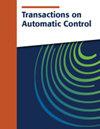具有时变非对称全态约束的多Euler-Lagrange系统的全分布一致性
IF 7
1区 计算机科学
Q1 AUTOMATION & CONTROL SYSTEMS
引用次数: 0
摘要
本文研究了有向图下具有时变非对称全状态约束的多Euler-Lagrange (EL)系统的一致性问题,该问题在去除了全局信息依赖的情况下是完全分布式的。首先,为了防止违反每个EL系统的全状态约束,对领导者和追随者都采用非线性状态相关变换,只要变换后的状态保持有限,就不会违反约束。然后,仅利用邻域状态构造约束非线性全分布观测器,并设计自适应增益来消除全局信息的依赖性;理论分析是通过使用基于图的对角矩阵构造一个新的基于积分的Lyapunov函数来完成的,确保了共识的达成。利用观察到的状态,开发了一种自适应后退状态跟踪控制协议,使每个EL系统的位置可以在可容忍的有界区域内跟踪领导者。从而实现了具有时变非对称全状态约束的多EL系统的领导-跟随一致性。仿真结果验证了所提控制方案的可行性和有效性。本文章由计算机程序翻译,如有差异,请以英文原文为准。
Fully Distributed Consensus of Multiple Euler–Lagrange Systems With Time-Varying Asymmetric Full-State Constraints
In this article, the consensus problem of multiple Euler–Lagrange (EL) systems with time-varying asymmetric full-state constraints under a directed graph is investigated in a fully distributed way, where the global information dependence is removed. First, to prevent the violation of the full-state constraints of each EL system, a nonlinear state-dependent transformation is adopted for both the leader and followers, where the constraints will not be violated as long as the transformed states remain finite. Then, a constrained nonlinear fully distributed observer is constructed using only neighbors' states, and an adaptive gain is designed to eliminate the dependence of the global information. The theoretical analysis is completed via constructing a novel integration-based Lyapunov function using a graph-based diagonal matrix, ensuring the achievement of consensus. Using the observed state, an adaptive backstepping state tracking control protocol is developed such that the position of each EL system can track the leader within a tolerable bounded region. Thus, the leader-following consensus of multiple EL systems with time-varying asymmetric full-state constraints is achieved. Simulation results are illustrated to show the feasibility and effectiveness of the proposed control scheme.
求助全文
通过发布文献求助,成功后即可免费获取论文全文。
去求助
来源期刊

IEEE Transactions on Automatic Control
工程技术-工程:电子与电气
CiteScore
11.30
自引率
5.90%
发文量
824
审稿时长
9 months
期刊介绍:
In the IEEE Transactions on Automatic Control, the IEEE Control Systems Society publishes high-quality papers on the theory, design, and applications of control engineering. Two types of contributions are regularly considered:
1) Papers: Presentation of significant research, development, or application of control concepts.
2) Technical Notes and Correspondence: Brief technical notes, comments on published areas or established control topics, corrections to papers and notes published in the Transactions.
In addition, special papers (tutorials, surveys, and perspectives on the theory and applications of control systems topics) are solicited.
 求助内容:
求助内容: 应助结果提醒方式:
应助结果提醒方式:


